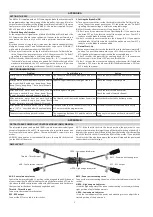
Instruction and Maintenance Handbook
FUN 14
EDITION
:
APRIL 2002
PAGE
:
9
AIR CREATION
Aérodrome de Lanas - 07200 AUBENAS - France
Tél. : 33 (0) 4 75 93 66 66 - Fax : 33 (0) 4 75 35 04 03 - Internet : www.aircreation.fr
Overhauling :
IMPORTANT
IN REGULAR CONDITIONS OF USE* A COMPLETE OVERHAUL OF THE WING IS
ESSENTIAL EVERY 150 FLYING HOURS** AND AFTER ANY HEAVY LANDING.
THIS OVERHAUL INCLUDING COMPLETE SAIL AND STRUCTURE DISMANTLING,
REPLACEMENT OF ALL SCREWS AND NUTS AND A SYSTEMATIC CONTROL,
MUST BE CARRIED OUT IN OUR WORKSHOPS OR IN AN AUTHORIZED
TECHNICAL STATION***. IT IS NECESSARY FOR SAFETY.
*
A peculiar use (mountain, tropics, sea environments and rough
fields) requires a superior frequency, i.e. every year and every
100 hours.
**
Or at least every two years if the wing flies less than 150 hours.
***
Whose operators follow a specific technical training in our
workshops. An updated list is available on demand.
Ageing of the fabric and seams of the sails may cause an important reduction of the wing resistance. The
degradation is principally caused through exposure to ultraviolet rays emitted by the sun and the moon. In order to
slow down the process, the sail should be stored folded in its cover, or if it stays rigged, in covered premises.
Always put it in a sheltered place, shielded from the rays of rhe sun, even between flights. These measures help to
lengthen/sail life.
A strip of identical fabric as the one used for the top sail is stitched to it in the middle and under the keel pocket.
The strip is made from two musters stitched together. During each periodical overhaul, part of the strip is cut off,
and submitted to a test of wear and tear. The result of the test determine the moment where replacement of the sail
becomes essential for reasons of safety.
Every 50 flying hours, check :
•
whether all screw are correctly tightened and that they have not worked loose.
•
the condition of the cables
•
possible tears in the sail
•
whether the symmetry of the batten profiles of the wings compare
•
the good condition of the rubber fixations of the battens and the strap maintaining the sail to the tension device.
(The tension of the ropes maintaining the four last battens situated at the tip of the sail should be very strong
indeed).
•
the fastening bolts :
o
of the cables at the bottom of the 'A' frame.
o
of the 'A' frame knuckle joints to the control bar
o
of the cross-bar leading edges link
o
of the tension device on the keel
o
of the hang point system
o
Change them if there are any trace of wear or rust.
































